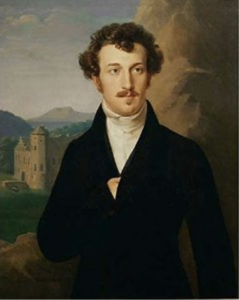What the digger for treasure desires
(Poet's title: Schatzgräbers Begehr)
Set by Schubert:
D 761
[November 1822]
In tiefster Erde ruht ein alt Gesetz,
Dem treibt mich’s rastlos immer nachzuspüren,
Und grabend kann ich Andres nichts vollführen,
Wohl spannt auch mir die Welt ihr goldnes Netz,
Wohl tönt auch mir der Klugheit seicht Geschwätz:
Du wirst die Müh und Zeit umsonst verlieren.
Das soll mich nicht in meiner Arbeit irren,
Ich grabe glühend fort, so nun wie stets.
Und soll mich nie des Findens Wonne laben,
Sollt’ ich mein Grab mit dieser Hoffnung graben,
Ich steige gern hinab, gestillt ist dann mein Sehnen.
Drum lasset Ruhe mir in meinem Streben,
Ein Grab mag man wohl jedem gerne geben,
Wollt ihr es denn nicht mir, ihr Lieben, gönnen?
Resting in the depths of the earth is an old law
Which is driving me to follow in its tracks, endlessly without a break;
And as I dig I can undertake nothing else
Even though the world stretches out its golden net over me,
Even though I hear the shallow gossip of conventional wisdom:
“You are going to waste all of that time and trouble for nothing.”
That will not distract me from my work,
I shall continue to dig fervently, now as always.
And even if I am never rewarded with the joy of discovery,
I shall at least have dug my own grave with this hope:
I am happy to climb down into it, for my longing will then have been assuaged.
So leave me in peace as I strive!
You can willingly give anyone a grave,
So, dear friends, why do you want to begrudge me mine?
All translations into English that appear on this website, unless otherwise stated, are by Malcolm Wren. You are free to use them on condition that you acknowledge Malcolm Wren as the translator and schubertsong.uk as the source. Unless otherwise stated, the comments and essays that appear after the texts and translations are by Malcolm Wren and are © Copyright.
☙
Themes and images in this text:
Digging Gold Graves and burials Hope Longing and yearning Lost and found Treasure and jewels
This is an unusual theme for a sonnet, a form usually associated with romantic love. However, the obsessive desire described here is clearly a kind of love. We are never told (perhaps the poet does not really know) what the object of the desire truly is, but this perhaps gives the text a sort of honesty. The reader is invited to understand the passion, the drive, rather than the ‘treasure’ itself, which is almost certainly out of reach for all of us.
Graham Johnson suggests that the text may have been written to answer critics of Schober’s work on the libretto for Alfonso und Estrella. For much of 1821 and 1822 Schober and Schubert worked hard on the opera, yet the singers who were due to star in it (Johann Michael Vogl and Anna Milder-Hauptmann) were less than enthusiastic about the results and the work was never staged in Schubert’s lifetime. Perhaps one or both of these singers (or one of the directors of the Vienna theatres) really did express the conventional wisdom that the composer was wasting his time and effort with such weak poetry and drama, and we can envisage Schober setting himself the challenge of writing a sonnet (a sonnet, no less!) in response. We also have to recognise that Schubert went to the trouble of defending his friend and colleague by setting the sonnet to music despite the failure of the operatic project. Schober even included the text (with some minor changes) in the published collection of his poems in 1842, so if he really was answering specific critics of his work he clearly had not forgotten the attack and still wanted to defend himself.
☙
Original Spelling Schatzgräbers Begehr In tiefster Erde ruht ein alt Gesetz, Dem treibt mich's, rastlos immer nachzuspüren; Und grabend kann ich Andres nichts vollführen, Wohl spannt auch mir die Welt ihr goldnes Netz, Wohl tönt auch mir der Klugheit seicht Geschwätz: »Du wirst die Müh und Zeit umsonst verlieren.« Das soll mich nicht in meiner Arbeit irren, Ich grabe glühend fort, so nun, wie stets. Und soll mich nie des Findens Wonne laben, Sollt' ich mein Grab mit dieser Hoffnung graben: Ich steige gern hinab, gestillt ist dann mein Sehnen. Drum lasset Ruhe mir in meinem Streben! Ein Grab mag man wohl jedem gerne geben, Wollt ihr es denn nicht mir, ihr Lieben, gönnen?
Confirmed by Peter Rastl with Gedichte von Franz von Schober. Stuttgart und Tübingen. J. G. Cotta’scher Verlag. 1842, page 161; and with Gedichte von Franz von Schober. Zweite, vermehrte Auflage. Leipzig Verlagsbuchhandlung von J. J. Weber. 1865, page 215.
Note: Schubert received all poems from Schober in handwritten form. A (possibly later) autograph of this sonnet is kept in the Vienna City Library.
To see an early edition of the text, go to page 161 [179 von 292] here: http://digital.onb.ac.at/OnbViewer/viewer.faces?doc=ABO_%2BZ20766660X


